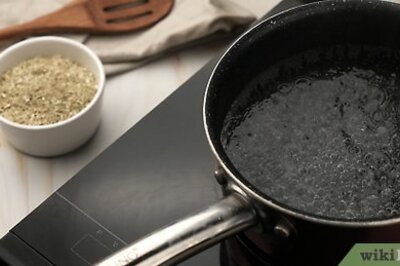
views
THIRUVANANTHAPURAM: Soon, school children in the city are going to be part of a major war against mosquitoes. They are out to make their houses as unfriendly as possible to the whiny bloodsuckers. Not just their homes, but two other houses in the neighbourhood as well, as part of a health initiative. If you take the total number of school students in the city and multiply it by three, the ‘mozzies’ will soon find it hard to buzz into houses. Vector control by fogging too will begin in a jiffy. But, why the sudden war cry? Because, the capital city is sitting on a dengue epidemic. In January this year, there were 161 confirmed dengue cases in the district, most of them in the Corporation area. In February, till this paper went to the press, there were 116 confirmed cases. Not to be left behind, the chikungunya virus, also spread by the same mosquito that spreads dengue, has raised its head in the city with nine confirmed cases in January and eight cases in February. Though there are isolated cases all over the State, the city’s figures are the highest for both the epidemics. Why is Thiruvananthapuram also the capital of dengue fever? No, it is not just about the Vilappilsala issue and garbage dumping as many would think. Of course, plastic waste that can hold clean water will contribute to a rise in mosquito density. But looking for clean water in a garbage dump might turn out to be more difficult than looking for the proverbial needle in the haystack - even for a mosquito. However, one rain can change the whole scenario. One leftover ice-cream cup, they say, can gather enough mist for the mosquito larvae. ‘’Rainwater would collect in the plastic bags dumped on the roadside, same with plates, cups and the like thrown on the road after parties. We have to initiate a vector source reduction drive immediately,’ said the DMO, Dr Peethambaran. The district medical authorities, along with the City Corporation, have taken up arms in the battle against the bloodsuckers. On Friday, a meeting of health workers, health officials, ward health sanitation committee members, Asha workers, state health workers and NRHM officials was held. Each ward health sanitation committee has been given a neat sum of ` 10,000 to get its anti-mosquito machinery running. ‘’See, the flying span of these aedes mosquitoes is less than 50 metres. So, the mosquito source would in all probability be our own houses. This is why cleaning up of our compounds becomes essential,’’ said NRHM district programme manager Dr Unnikrishnan. Public health experts feel one possible reason for the high incidence of dengue in Thiruvananthapuram could be the lack of community participation in vector control measures. Are we indifferent is the million dollar question. ‘’If everyone could set apart one day of the week or at least a couple of hours on Sunday as a dry day, it could go a long way in mosquito control. We need to clear our premises of collected water,’’ said state epidemiologist Dr Sukumaran. As soon as the water containers are emptied, the larvae die. As of now, apart from the Corporation area, dengue cases have been confirmed from Vizhinjam, Karakulam, Navaikulam, Kilimanoor, Sreekariyam, Andiyoorkonam, Kazhakkoottam, Anayara, Vattiyoorkavu, Beemapalli and Kadakampalli. So why are you waiting for the bloodsuckers to track you down? The Virus* A major threat to health in the tropics, the dengue virus (DENV) belongs to the family Flaviridae. Other family members are equally deadly, causing Japanese encephalitis, Yellow fever, West Nile fever and so on. * The dengue virus has four major subtypes, each with slightly different viral proteins. In the city, certain areas have Type 2 and Type 4 while others have Type 2 and Type 3.* Many scientists believe that the deadly haemorrhagic disease is caused when a person is infected with one subtype and then later with a second subtype.* Antibodies gained from one infection does not seem to give immunity against all four subtypes.* Vaccines have to be quadrivalent to fight all four subtypes and are yet to materialise.The Symptoms* Dengue manifests in three forms - the dengue fever, the dengue haemorrhagic fever and the dengue shock syndrome. Dengue fever comes with severe headache, chills, pain upon moving eyes, joint pain, and rashes on lower limbs and chest. Clinically, platelet count will drop until the patient’s temperature is normal.* Dengue haemorrhagic fever, caused by the same virus, is more severe with deadly complications. It has symptoms of dengue fever plus severe continuous pain in abdomen, bleeding from nose, mouth, gums or skin bruising, frequent vomiting with or without blood, black stools like coal tar and so on.* Dengue shock syndrome has additional symptoms of weak rapid pulse, narrow pulse pressure and cold and clammy skin. The Treatment* There are no specific anti-viral tablets or injections that can kill the virus. However, a lot of supportive care and treatment can go a long way in saving a patient suffering from dengue fever. * Fever is treated by anti-pyretics, like paracetamol. Pain in the bone should be treated by analgesics or pain-killing tablets. In case of dengue haemorrhagic fever or dengue shock syndrome, hospitalisation is a must.* Homoeopathy offers preventive as well as curative medicines.Fact FileTrivial facts about a non-trivial insectQ: How many species of mosquitoes are there? A: About 2,700. Q: And how many are resistant to at least one insecticide? A: More than 50. Q: What does a mosquito weigh? A: About 2 to 2.5 milligrams (for an Aedes aegypti). Q: How much blood does a female mosquito drink per, er, serving? A: About 5-millionths of a litre (for an Aedes aegypti). Q: What happens if you cut the sensory nerve in the mosquito’s stomach?A: The little whiner can keep sucking blood until it bursts. (Oh, sweet justice!) Q: How fast can a mosquito fly? A: An estimated 1 to 1.5 miles per hour. Q: How far away can a mosquito smell you, or a cow or another host? A: 20 to 35 metres. Q: Why does a film of oil on water kill mosquito larvae? A: Because the oil clogs up the snorkel that the larvae use to breathe. Q: What does mosquito saliva have to do with some kinds of rat poison? A: They both contain anti-coagulants, chemicals that prevent the blood from clotting. Q: When do mosquitoes feed? A: Daytime. Nighttime. And all times in-between. Truthfully, some species prefer different times of day or night. This behaviour may have evolved to match the host’s behaviour. Q: Do they ever stop sucking blood? A: Yes. For starters, males never suck blood. And females don’t do it more often than necessary, since it exposes them to the host’s defensive behaviours (read swat, slap, Odomos)




















Comments
0 comment